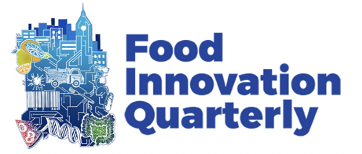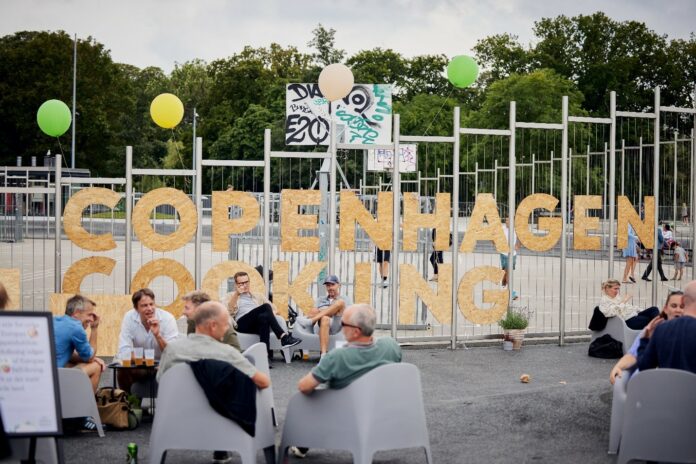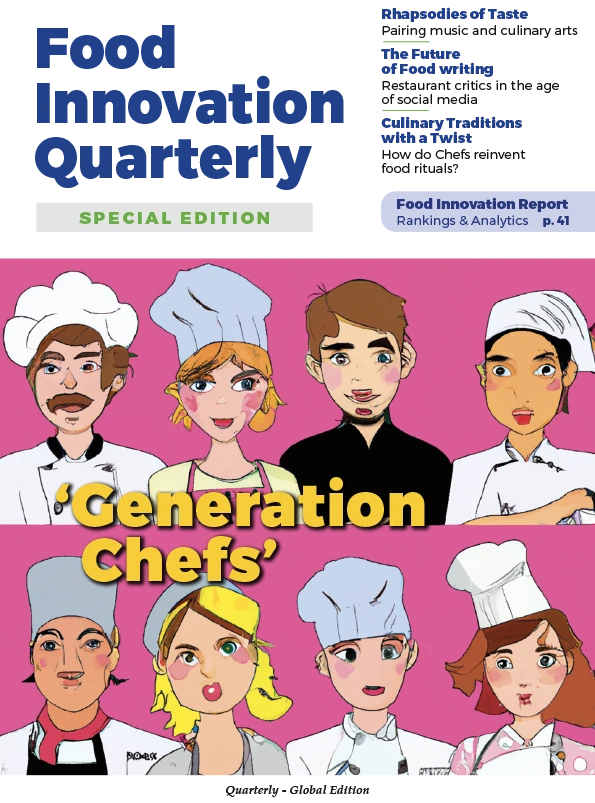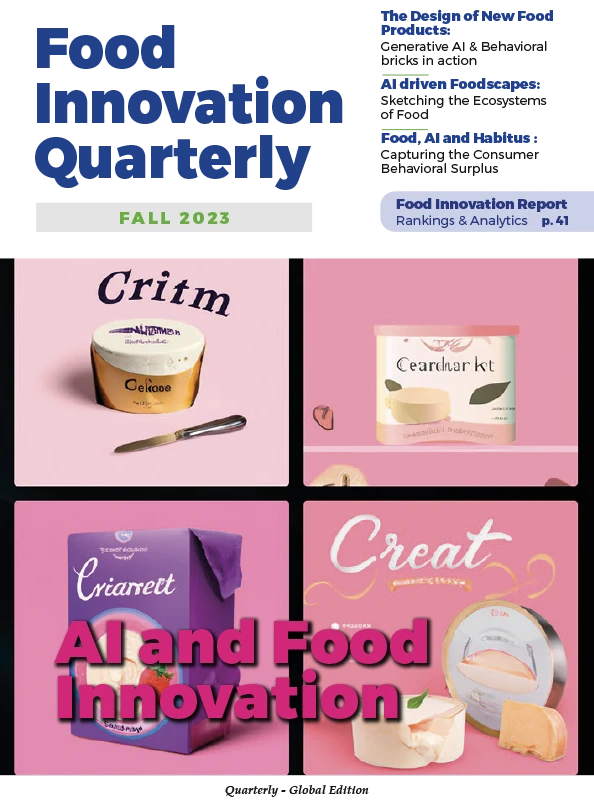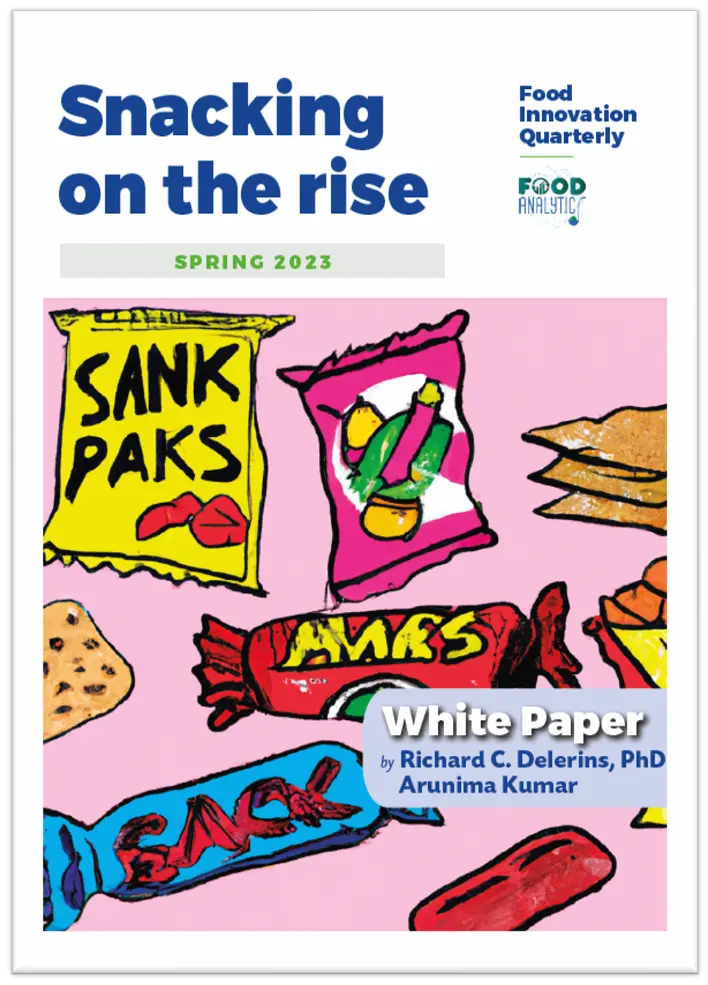Copenhagen Cooking is an annual festival in late August that celebrates the city’s varied and vibrant food scene with exhibitions, chefs and restaurants, communal dining, and fun workshops throughout the city. It is owned by FOOD, the non-profit Food Organisation of Denmark which works to develop Denmark’s food culture and production through three major events, plus journalism outreach, advisory assistance to food producers and restaurants, and support for The Foundation of Danish Gastronomy, The Peoples Meeting on FOOD and several other initiatives all over Denmark.
As a background, Denmark was historically limited in its cuisine, constrained by its short growing season and an entrenched culture of hearty meat-and-potatoes daily meals, Then, starting back in the 1980s, a series of events drove an openness and excitement for new dishes, flavors, ingredients and experiences. Irma, the beloved supermarket chain that pioneered the introduction of organics in Denmark, became a constant source of innovative new products from local suppliers and startups. Danes became enamored with international cuisines and less common flavors, often importing both the foods and the recipes from other countries. Then, Copenhagen put itself on the gastronomic map as an unexpected movement which exploded on the scene and refocused attention on Scandinavian food culture and societal values: New Nordic Cuisine, distilled into a set of 10 principles and brilliantly executed at noma restaurant by René Redzepi.
While noma has announced its closure, the fine dining industry continues to push forward in different directions, and some elements of New Nordic have made their way into the mainstream. Locally sourced ingredients are still high on the priority list, but sustainability shows up in many ways, especially in a broader interest in plant-based foods, more attention to the reduction of food waste, and new ways to use traditional techniques like fermentation to expand the Danish flavor palette.
Copenhagen Cooking focuses on the experiences of cooking in new ways, exploring new foods and sharing meals. As a visitor to the 2023 festival, I had the opportunity to meet with some of the leaders reshaping this innovative Danish food scene.
Three visionaries champion sustainability, each in a personalized, uniquely impactful way: Trine Krebs, Matt Orlando and Irina Bothmann.
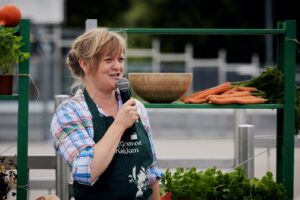
Trine Krebs is a force of nature, in the most double-entendre way imaginable. Eloquently passionate about food’s integral role as part of the human experience, she is an environmentalist, farmer, home education teacher, event organizer, volunteer and advocate, all wound up in a free-spirited bundle of energy and warmth. She was an influencer long before it was a “thing”.
Trine proposed this year’s Copenhagen Cooking theme: the much-maligned, often-overlooked potato. She makes a case for why bringing it back into everyone’s kitchen is good for Denmark and good for the planet.
Country living, potatoes and finding community in food
In the past, Danes embraced the potato because it was an excellent low-cost, climate-aligned staple food, but over the years its popularity diminished as sexier, more exotic ingredients took its place. Also, Danes aren’t shy about eating meat, and the country’s agricultural land is overwhelmingly skewed toward animal raising and animal feed crops—77% as of 2019, which accounts for almost 90% of Danish agricultural emissions.
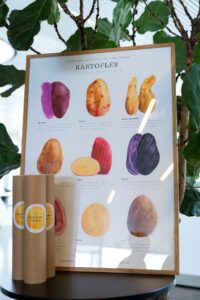 The Danish Parliament set greenhouse gas reduction targets that are even more ambitious than those of the EU, and shifting agriculture from animal production to plants for human consumption is a huge opportunity to help achieve this. The festival’s focus on the potato is part of this larger campaign. Trine and her colleagues wanted to elevate the potato’s culinary status in new, creative ways, showcasing the many varieties that can be grown in Denmark, with workshops and special restaurant menus during the festival.
The Danish Parliament set greenhouse gas reduction targets that are even more ambitious than those of the EU, and shifting agriculture from animal production to plants for human consumption is a huge opportunity to help achieve this. The festival’s focus on the potato is part of this larger campaign. Trine and her colleagues wanted to elevate the potato’s culinary status in new, creative ways, showcasing the many varieties that can be grown in Denmark, with workshops and special restaurant menus during the festival.
Trine’s knowledge of the culinary world and related information about nutrition, economics and environmental impact is encyclopedic—just pick a topic, and she will have a long list of facts, statistics and examples to support FOOD’s objectives and her own lifelong mission to bring plants to the forefront of the menu; she also knows everyone in the Danish restaurant scene, most on a friendly, first-name basis.
In her previous company, Frugtformidlingen, she organized events and sampling exhibits for Danish food producers, and she’s worked with organic and specialty farmers and food startups to introduce their products to the Danish supermarket industry.
The thread that weaves through Trine’s long and varied history has always been a desire to create a new Danish culture around food, focused on slowing down and really enjoying it, even celebrating it—a sort of “mindfulness” (my word, not hers) about the whole process of growing, cooking and eating. In the world she envisions, food becomes one of the central links in a tightly interconnected community, bringing people together and enriching their lives in ways that transcend food’s basic values of flavor and nutrition.
Her passion finds its way into every corner of her life. Trine lives on a small farm in the countryside, and travels everywhere on her bike and by train. She is active in volunteerism, has been the chairperson of many food-related initiatives, and was the only woman farmer on the reality dating show Farmer Seeks Love (Landmand søger kærlighed). She is looking for kindred spirits interested in relocating there to help her develop it into a shared living and farming space. Can’t wait to see how that evolves! (See more on Trine).
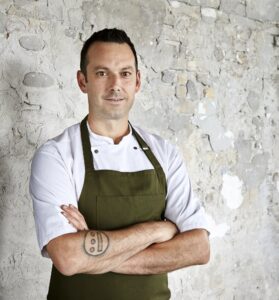
Matt Orlando is the former Head Chef from noma, who also worked with several other stars of gastronomy—Charlie Palmer, Eric Ripert, Raymond Blanc and Thomas Keller—and then ran Amass, his ground-breaking Copenhagen restaurant, for 10 years. Matt watched the New Nordic Cuisine movement develop around him, but while he agreed with some of its principles, its acidic, green, relatively lower-fat flavor palette never quite aligned with Matt’s San Diego-born taste buds and his desire for stronger, punchier flavors.
From responsible dining to responsible products
Matt created Amass as an alternative to the rigidity of the Nordic palette, with a rich, high-flavor dining experience delivered in a more casual, convivial setting in a waterfront warehouse, with an outdoor space with fire pits for before-dinner drinks or dessert. His California affinity for open air, lots of space for strolling around, and warm, hypnotic beach bonfires inspired the restaurant design.
Still, Matt was a strong believer in the sustainability goals behind New Nordic, and managed to create menus that adhered to local sourcing just as tightly. Matt says, “We were really just trying to operate a restaurant in the most responsible way possible. I would say that 99.5% of our ingredients were local, and what I mean by that is 99% came from Denmark and the 0.5% was when we would occasionally get some seafood from Sweden or Norway. By default, Amass became the most Nordic of them all.”
One of his biggest changes to the restaurant culture he grew up in was to foster tight, two-way relationships with his produce suppliers and let them have a say in what they could deliver when, in what quantities and in what shapes, sizes and colors. “At first, they didn’t understand—they were like, ‘just tell us what you want.’ We said, no, no, you’re the farmer. You tell us exactly what you have, and when it’s the best. And we’ll take them, no matter what size they are, and find a way to use them. Because generally people order 500 radishes that are exactly the same size and anything else gets rejected or thrown away.” Matt says this “use it, no matter what” approach ended up becoming a driving force in the Amass menu creative process.
Matt also takes issue with the way the word “sustainability” gets tossed around these days and has become more of a marketing term than a grounding philosophy in the food industry. At Amass, he developed a simple rule that invoked the idea of responsibility: “For every single decision we made, we asked ourselves ‘Is this the most responsible version of this decision we can make?’ And I’m not naive to the fact that in the restaurant industry, sometimes you need to make decisions that aren’t the most responsible. But when that would happen, we would sit down as a team and define a path to get to the most responsible version of that decision.” Amass took emissions measurements and brought in outside analysts to assess the restaurant’s carbon footprint, and constantly updated its menu and practices to improve.
Amass closed its doors in November 2022, following the struggle all restaurants faced during the pandemic. However, Amass created its own legacy, and led Matt to start the Copenhagen-based venture, Endless Food co. Endless Food co. works with food producers to find ways to use their side-streams and by-products as ingredients in other food products, especially flavoring components.
Matt and his partners Christian Alexander Bach and Max Bogenmann leverage their understanding of fermentation and enzymes to transform what would otherwise be food industry waste into delicious ingredients that provide an entirely new palette of flavors that no one else can offer. “At Amass, we did a pumpkin dish that lacto-fermented and powdered the pumpkin seeds into a seasoning, then slowly blackened the hard outer skin until it became sweet and soft, and blended it. Then from that we made a pumpkin skin miso. One entire ingredient, two very different flavors using different processes and extractions.”
This approach to culinary development, both art and science, is the engine behind Endless Food co. Their non-cacao ingredient “THIC (This Isn’t Chocolate)” already has a growing list of customers in the pastry and confection industries. Endless Food co. is actively seeking new partners in the food industry who strive to reduce food waste in their operations.
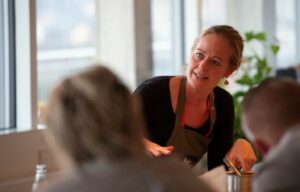
Irina Bothmann is a chef who’s made it her mission to change how other chefs think—about their kitchen processes, their suppliers, and the whole system they create to run their operation—and find ways to reduce food waste. It’s akin to the re-engineering overhaul many manufacturing operations do from time to time, finding ways to make the same great quality product in a more efficient, cost-effective way, except efficiency in this case is focused on the reduction of food waste.
Rethinking the restaurant kitchen
Irina has championed her cause across the Danish food landscape over the years, starting with a zero-waste eatery, Spisehuset Rub & Stub (the Danish expression translates roughly as “lock, stock and barrel”, meaning every last bit gets used). She and her team created a new, ever-changing menu each day based on the surplus produce from farms, wholesalers and food producers. The Danish Food Bank also provided some interesting culinary ingredients that had no appeal to soup kitchens and shelters—things like fresh mushrooms and lobster stock.
Her team also makes an impact at the Roskilde Music Festival each year. The festival strives to minimize its environmental footprint with high-value deposits on beverage containers to encourage returns, efficient waste sorting systems, and the Rub & Stub “Food Rescue” program, which gathers and sorts surplus ingredients from festival vendors, and then uses it to cook and distribute meals to social organizations throughout Denmark. Their effort collected 23 tons’ worth in 2019, which yielded around 57,000 meals.
Irina and her team have worked with the Danish Ministry of Food and Environment and the Folk High School system to reduce waste in the school cafeteria and educate students about food waste reduction through workshops, contests and events. She also participated in a masterclass project for local chefs and food service staffs (even for the local NATO base kitchen staff!), sponsored by the Danish Embassy in Riga and the Danish Cultural Institute in Estonia, Latvia, and Lithuania.
Today, Irina is a consultant to workplace cafeterias, helping them transform their menus and operations to minimize food waste, and also provide a more balanced, varied and health-focused set of daily offerings. These two objectives often seem to compete with each other: more items in the inventory, a shift toward more plant-based foods, and alignment with seasonality all introduce complexities that cafeterias have traditionally viewed as inefficiencies. Convincing these chefs to change a system they’ve worked hard to build is a big challenge.
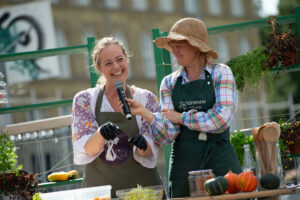
But even harder is the change the cafeterias have to make space for in the minds of their customers, who are a “captive audience” and not shy about complaining if there are too many unfamiliar menu items or not enough meat options. Irina is a big advocate of inclusive language and wishes we could avoid, or at least minimize, labels like “vegan” and “vegetarian” on the menus.
“For many people, ‘vegan’ isn’t just about the food—it’s a whole lifestyle. For example, some vegan households choose not to have pets, to allow animals their freedom. But by assigning people to a certain segment or group with the words on a cafeteria menu, you risk singling them out, and nobody likes to be in the minority. Why call it ‘vegetarian lasagna’? Just call it ‘today’s lasagna’ and note the ingredients.”
She also structures her consulting workshops with lots of hands-on preparation and coaching, and introduces new plant-based recipes to the chefs. This helps them drop their guard a bit and roll up their sleeves, putting them in a more open state of mind. Usually, they’re amazed at how delicious the results are, which gives them confidence to take a few risks with menu changes. “One killer recipe can be just as powerful as lots of lecturing,” say Irina.
While her business is making changes one cafeteria at a time, Irina also sees the big picture, the need for systemic changes in the food system. “I dream about people with the courage to make the changes—the politicians, the innovators, the big companies. I want Denmark to go out in front with the chariot, not talk about it so much, but just go do it.”
